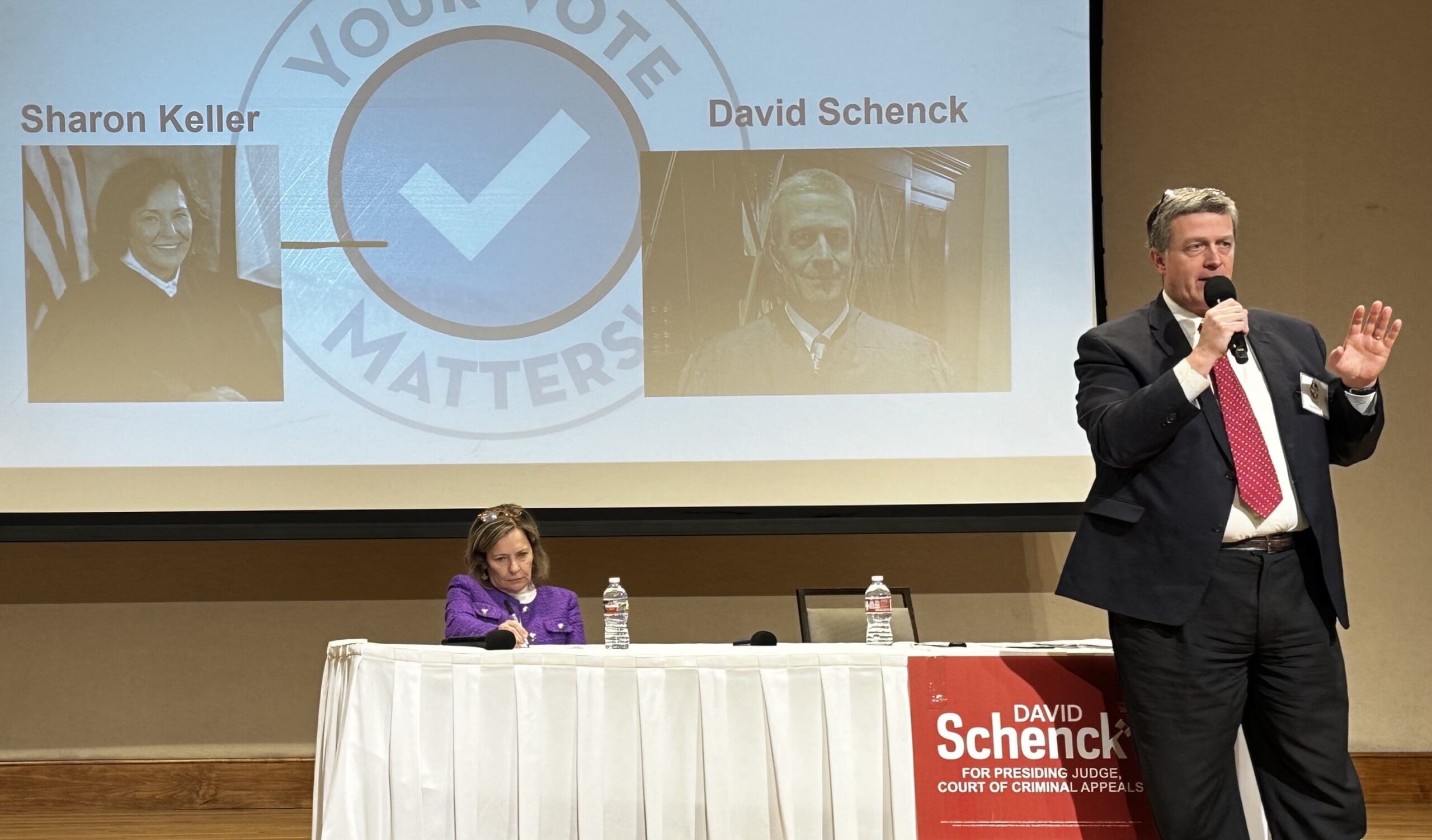As early voting kicked off in the March 5 primary election, the two Republican candidates for presiding judge of the Texas Court of Criminal Appeals faced off, presenting voters with contrasting views of how the court has been—and should be—run.
Incumbent Sharon Keller and challenger David Schenck fielded questions at a packed forum Monday night hosted by the Republican Club at Heritage Ranch in Collin County.
Keller touted her years of experience, while Schenck said it’s “time for a change.”
The Court of Criminal Appeals is the state’s highest court for criminal matters. All nine judges on the current court are Republicans.
Keller has served on the court since 1994 and been presiding judge since 2001.
Schenck is a 56-year-old appellate lawyer and former assistant attorney general who served eight years on the Fifth Court of Appeals in Dallas and has chaired the Texas State Commission on Judicial Conduct.
During his opening on Monday, Schenck noted that 70-year-old Keller is unable to serve the full six-year term they’re running for since state law requires judges to retire at age 75. If Keller is re-elected, an unknown governor will appoint her replacement.
Schenck said the country and the state are facing a crisis of lost public confidence in the courts, including the Court of Criminal Appeals.
“This court leaves room for improvement on the fairness, on the competence, and on the timeliness of its work,” he said. “I think it’s time for change.”
Keller noted she is “the longest serving presiding judge in history of the court.”
“I carry a full caseload just like the other eight judges. I always stay current with my cases,” she said. “I’m also the administrative head of the court, which is a whole other job.”
Choosing Cases to Review
The criteria for reviewing cases are laid out in the court’s rules. The court must hear death penalty cases but otherwise chooses which cases to review.
Schenck said the key factors to consider are the importance of the jurisprudence to state, the nature of the case involved, and the consequences to the public.
But he said the larger issue is stewardship of the court.
“Right now, the court is struggling to get its cases decided timely,” said Schenck.
He said some cases have been pending since 2019.
“It’s a crisis for everybody,” he said, “and the job of the presiding judge is to preside.”
Keller said key criteria for accepting cases include whether there is a split among the courts of appeals or a constitutional issue.
She said the court disposes of more cases every year than it takes in. “That doesn’t mean we don’t have some old cases. We do have some old cases. I don’t have any old cases. I have circulated opinions in every case that has been assigned to me.”
“We have a difference of opinion about my job,” said Keller. “He thinks that I have a responsibility to turn in my colleagues to the Commission on Judicial Conduct if they are what he considers behind on their cases. I don’t think I do.
“I wouldn’t ever turn in a colleague of mine to the Commission on Judicial Conduct,” she added. “The court works as well as it does because we get along and we have collegiality, and I lead by example. But I would not turn my colleagues in to the Commission on Judicial Conduct.”
Prosecuting Election Crimes
The candidates were asked how election fraud cases should be handled following the Court of Criminal Appeals’ controversial 2021 ruling that concluded the Texas attorney general does not have constitutional authority to prosecute criminal cases.
“We’ve got criticism left and right, thousands of phone calls, emails, and communications asking us to reverse our opinion,” said Keller. “We didn’t. We ruled in conformance with the constitution.”
She said there has been “a lot of misinformation” about the Stephens case, and that the court issued a similar opinion in 2002 stating that the attorney general has never had the authority to initiate a criminal prosecution.
Keller said a constitutional amendment is required to change that. “That’s not an issue that judges should concern themselves with. They read the constitution and they follow it, which is what I assume you want us to do. The rest is up to the legislature.”
Schenck said, “This is one of the major challenges I think that’s facing the state right now. People do not have confidence in our judiciary—as they shouldn’t. They don’t have confidence in our elections and are concerned about one thing: stewardship and accountability.”
He said the 2021 ruling in the Stephens election fraud case is not the only decision he’s concerned with that’s come out of the Court of Criminal Appeals.
“My concern is not so much with the outcomes of these cases,” he said. “I’m not going to tell you I’m here to assure anybody a particular result in a particular case. What I’m telling you is, if you’re going to do something as spectacular as pick a fight with two other branches of government and announce that you and only you have the authority to initiate a criminal prosecution, and then to preside over something we used to call the star chamber, you had better write an opinion that regular people and lawyers alike can read and understand that you know what you’re doing.
“It’s not just that case,” he added. “I grade judges and courts on fairness, competence, and efficiency. No court is a law unto itself. You don’t get to say, ‘We all want to be collegial, so I’m not going to follow the ethics rules.’ At some point you work for the people, not the other way around.”
Funding Judicial Campaigns
Schenck said he believes campaign contributions pose a threat to the independence of the state’s elected judges.
“They do threaten the integrity of the judiciary. They undermine the public perception of the fairness of these courts,” said Schenck. “It’s an unfortunate reality that we have to finance our campaigns, but I have no objection for instance to the PAC contributions that my opponent has received. In this case, they’re following the rules. The problem is, the rules are wrong.”
The U.S. Constitution as interpreted by the U.S. Supreme Court assures every litigant in every court the right to a judge or judges who are fair in fact and in appearance. If the judge can legally pick up the phone and call one side the day before the hearing and say I’d like $1,000 from you or $5,000 and get it, and the other side isn’t told about it, that is outrageous. That is permitted today in Texas.
“The courts are in charge of their own affairs,” he added. “We could write rules tomorrow that require judges to report contributions the minute they come and litigants to tell the other side, ‘I got money in this case.'”
Keller didn’t address the issue of campaign contributions but said she trusts the citizens of Texas to know what they want and to elect judges.
“I trust the public. I’m a member of the public,” she said. “I want the judges to be responsible to me and accountable to me.
“I believe that you all have the right to elect judges,” she added. “The judges on our court are accountable to you. And if you don’t like what they’re doing, you can replace them.”
Keller’s only campaign contribution for this election cycle is $15,000 from Texans for Lawsuit Reform PAC. Schenck has reported zero campaign contributions this election cycle, though he’s received contributions for past campaigns.
Most Important Issue Facing the Court
Asked what is the most important issue facing the Court of Criminal Appeals, Keller said “people pouring across the border illegally” and “death penalty cases.”
Schenck said the crisis at the border is important, but “the real problem in this state is crime,” which he attributed to a “lack of stewardship in the courts.”
“If the public loses confidence in the judicial system, where will they turn?” he said.
In closing, Keller said Schenck “misunderstands the nature of the job.”
“It’s not about getting along. Collegiality is about getting things done,” she said, adding that in some years the Texas CCA is the busiest appellate court in the country.
She asked voters to consider her law enforcement endorsements and years of experience on the court.
Schenck said, “We need the judiciary under different leadership, a new generation of leadership.
“We need courts that work. We cannot have criminals running the state. We cannot have chaos in our cities. We cannot have a crisis on our border without judges that are willing to do the job, be fair, be competent, show the public what they’re doing, and get their work done on something like a reasonable basis,” he said.
“The problem in this state, the problem in this country, is not corruption,” Schenck added. “There’s a fairly small number of people that are actually corrupt. The real problem is the 85 percent or so of other people who are unwilling to confront it, what has happened: the laziness, the corruption, the stupidity. We can survive all of that if we just have somebody stand up and lead, because the rest of them will follow.”
Early voting is underway now through March 1. Primary Election Day is Tuesday, March 5.
The Republican primary winner will face Democrat Holly Taylor in the November general election.
No ads. No paywalls. No government grants. No corporate masters.
Just real news for real Texans.
Support Texas Scorecard to keep it that way!





